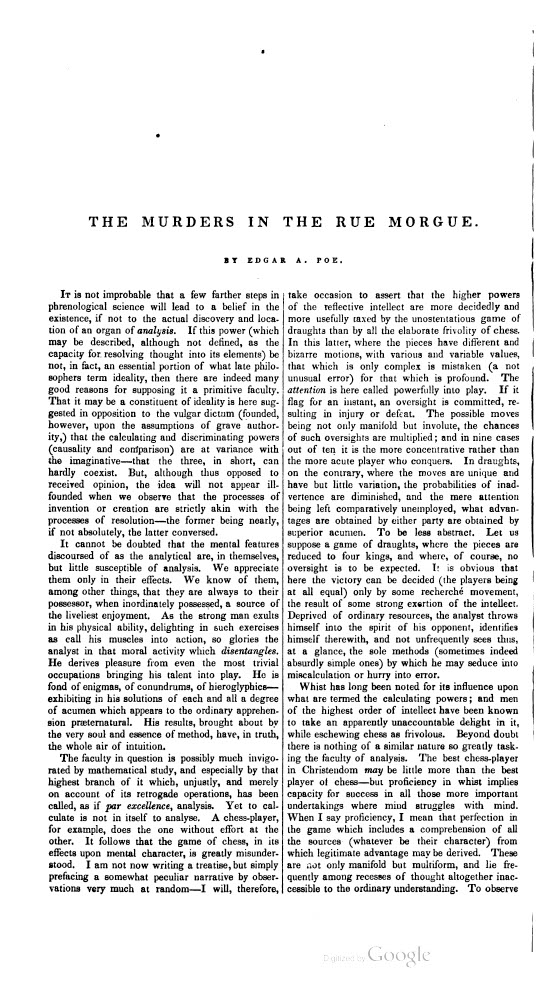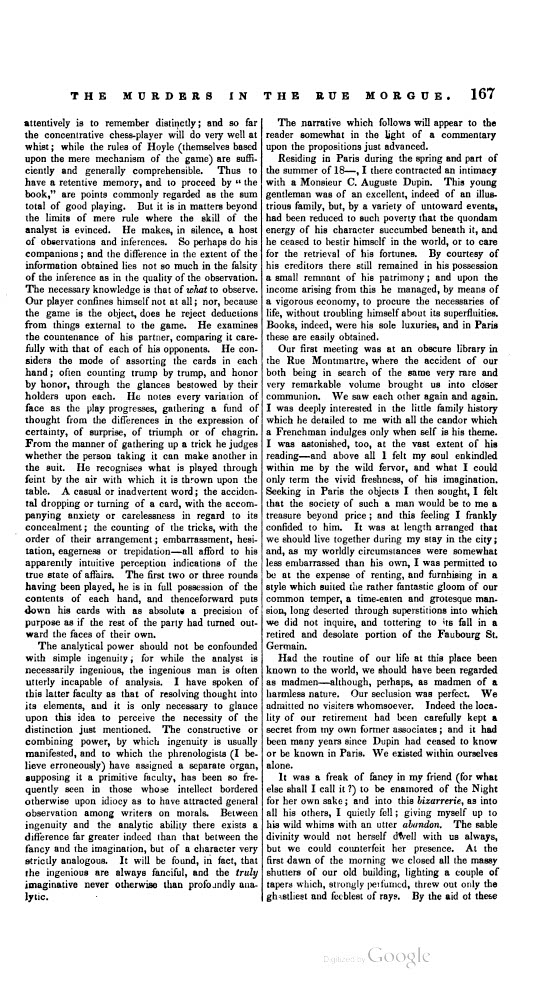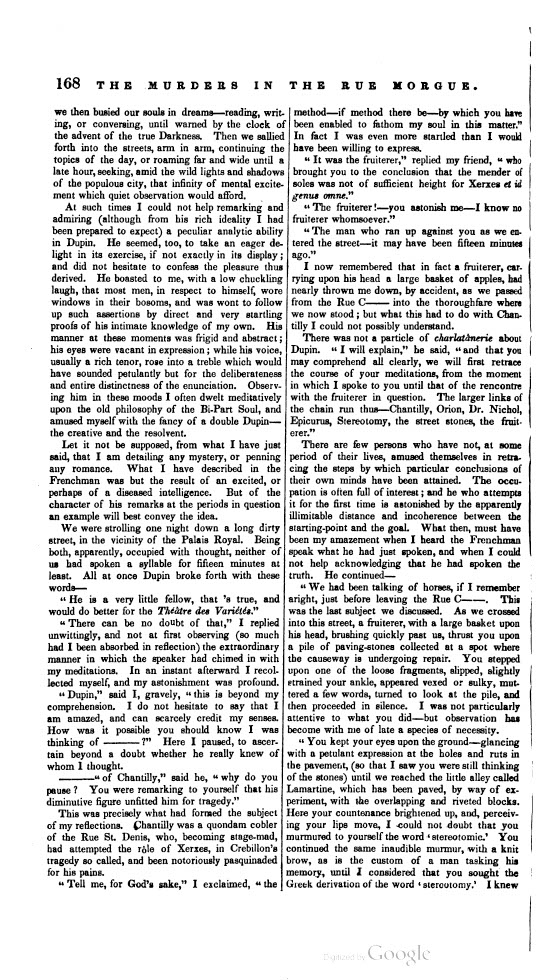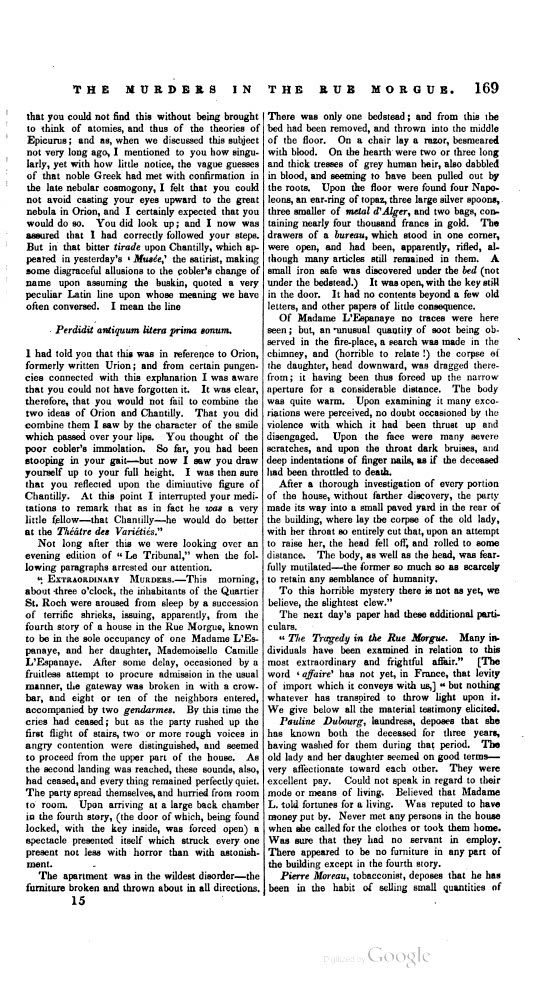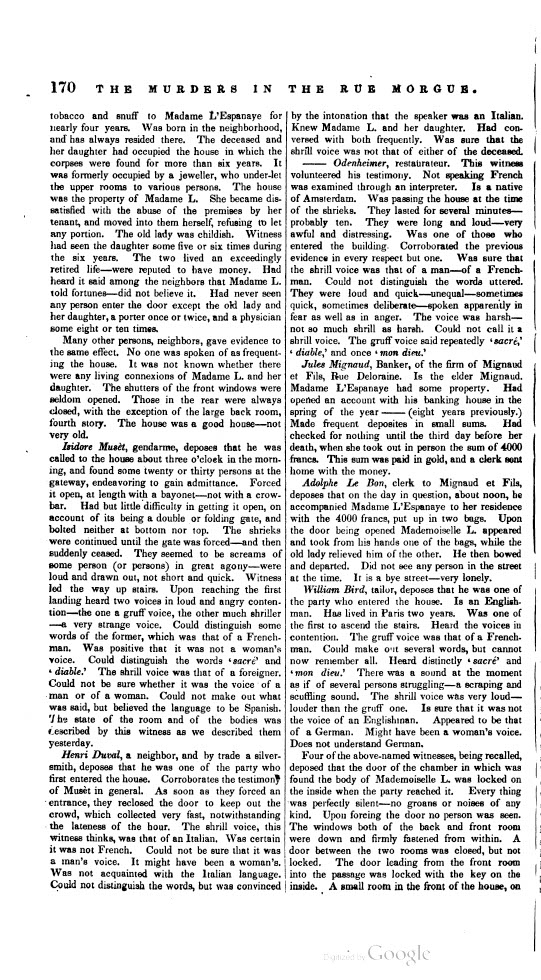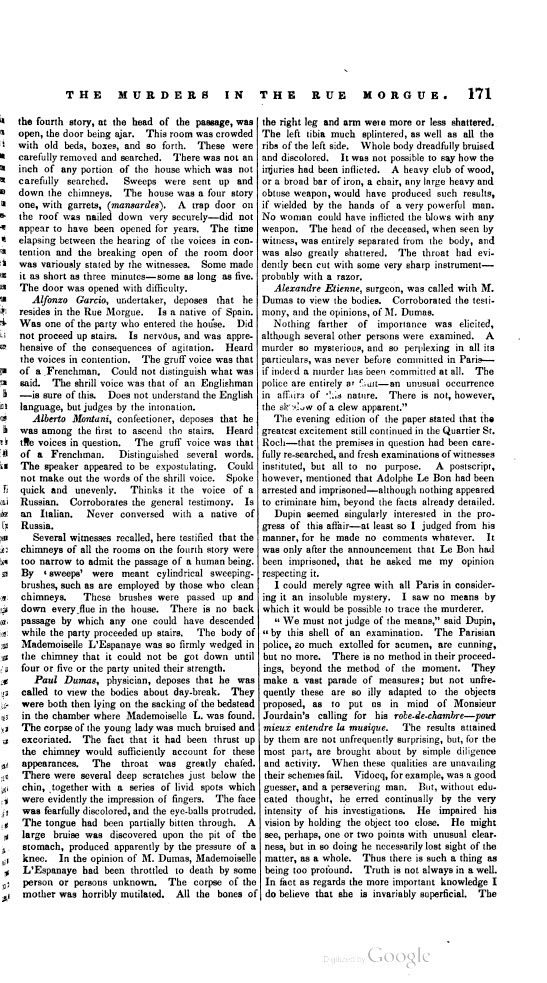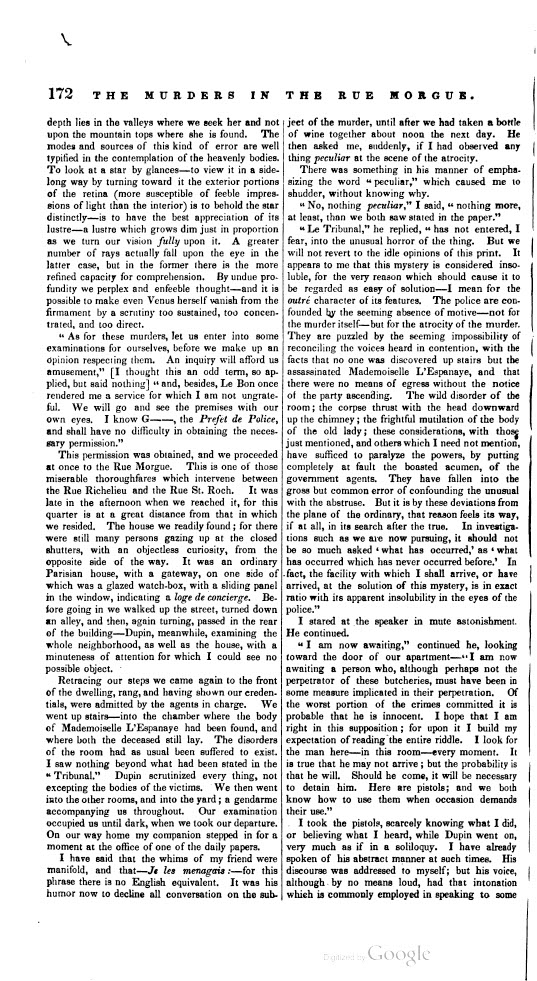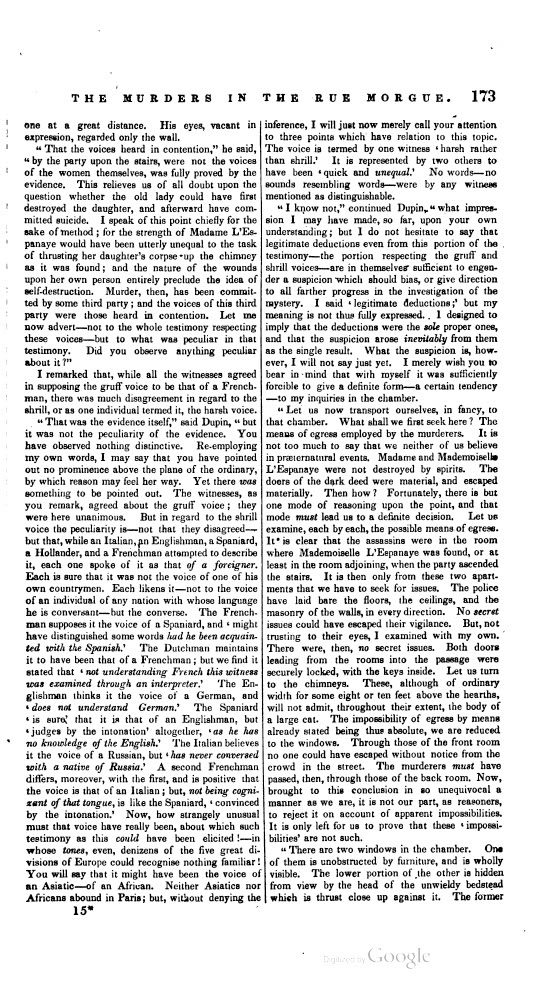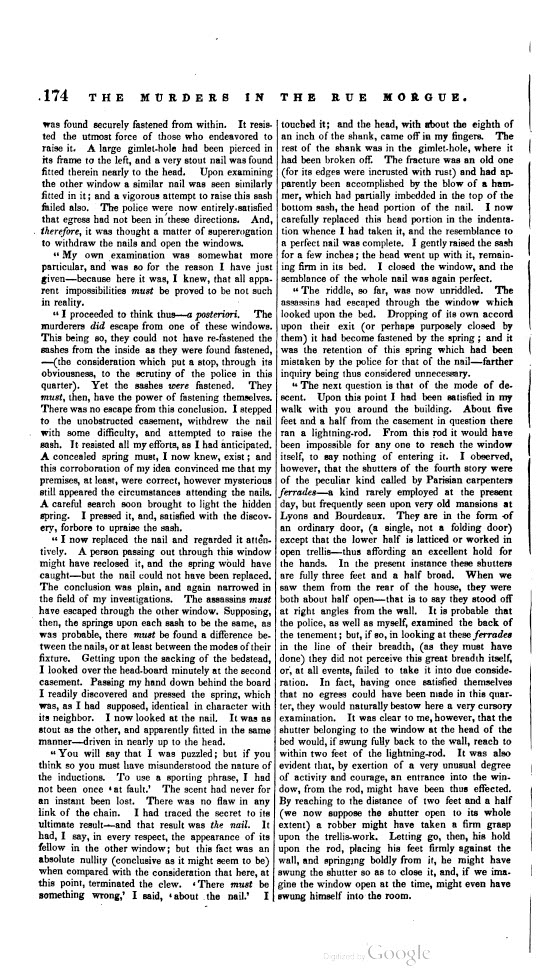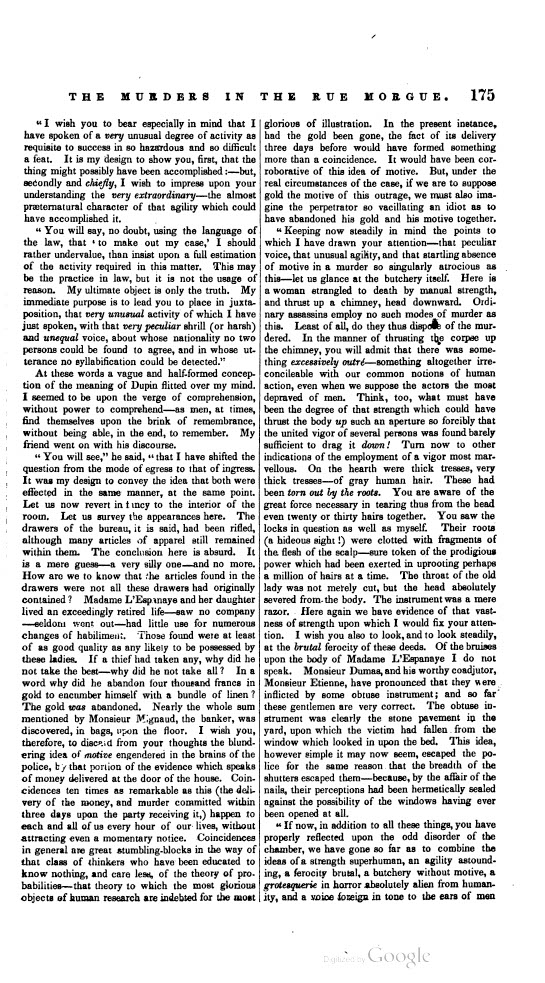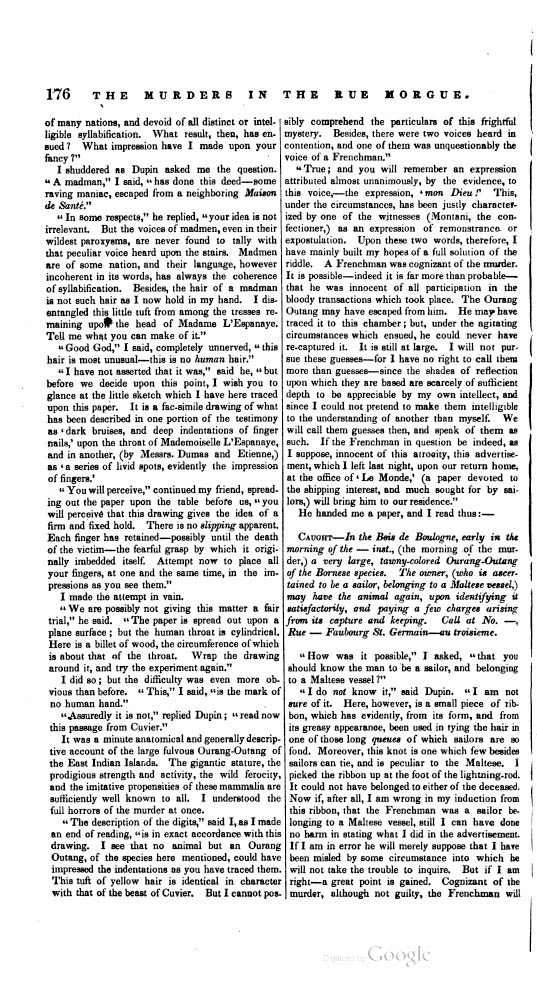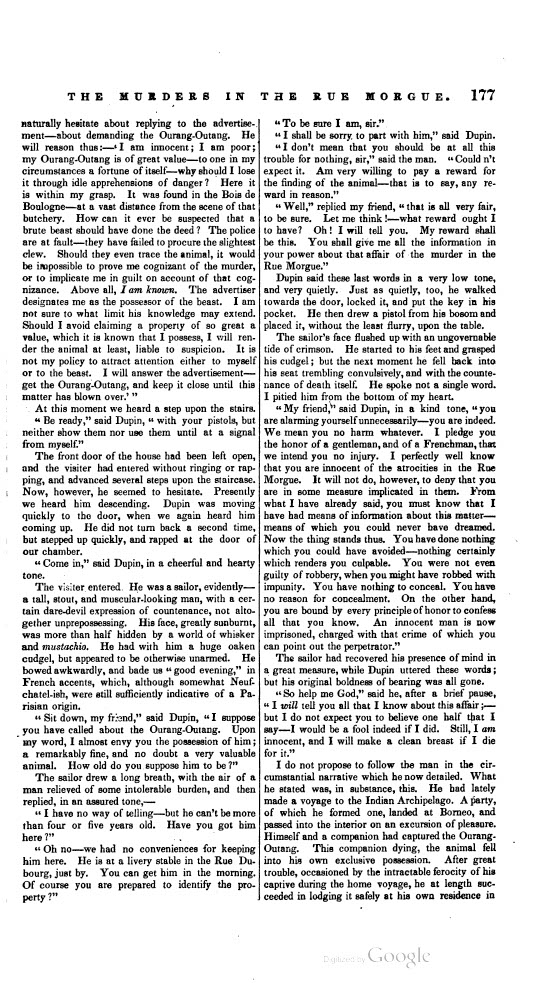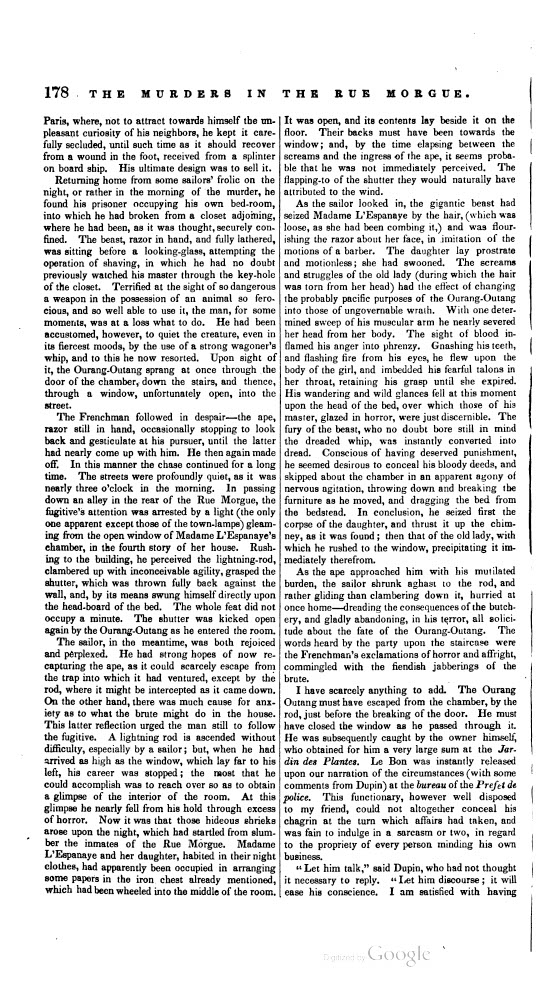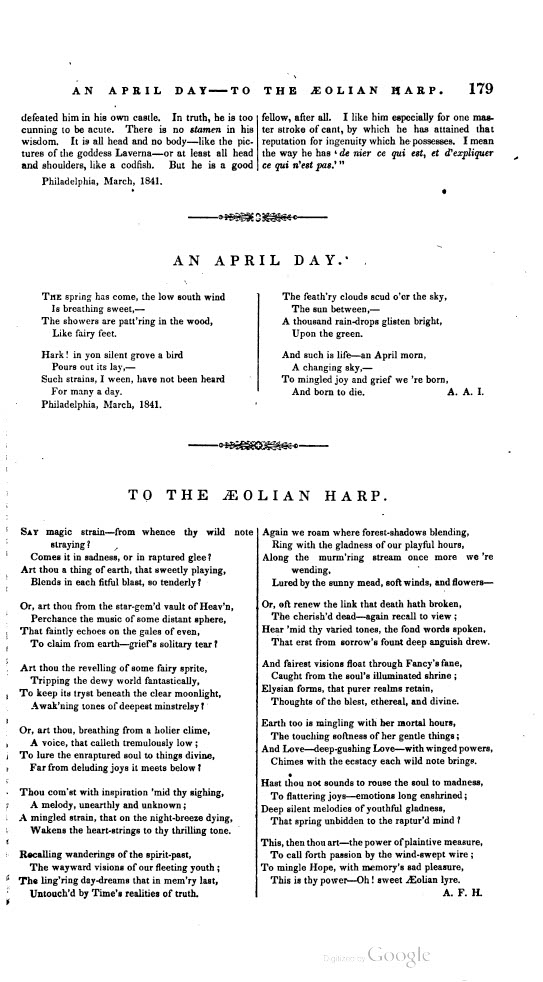"The Murders In the Rue Morgue"
By
Edgar Allan Poe
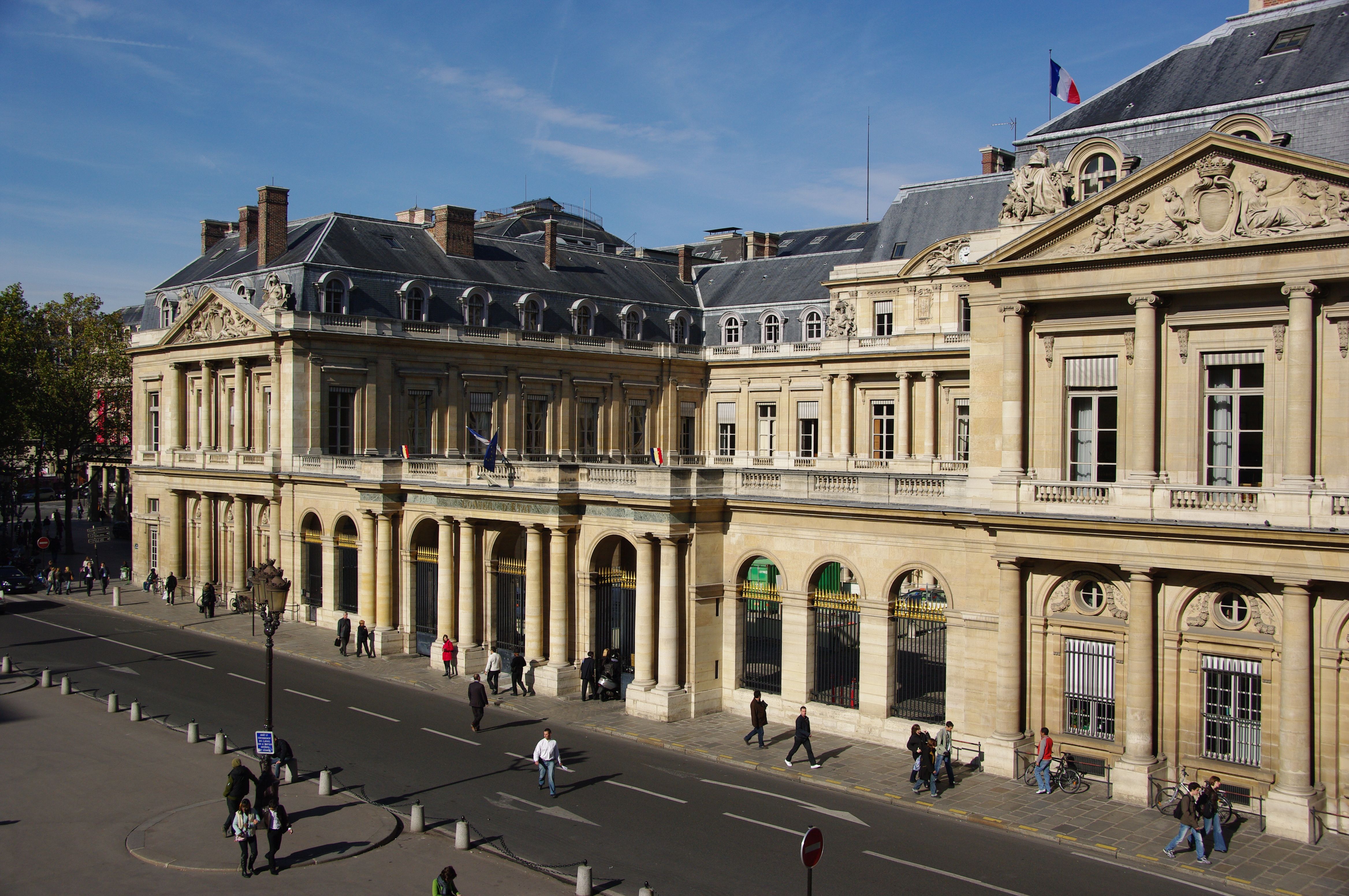 - [MUStudStaff]theatreHistoric Parisian
theater on the Rue Montmartre, known for opera shows. It was established as a histocric
landmark in the 1970s; this picture is of the theater taken in 2015 by Nicolas Ravelli, via Flickr.
- [MUStudStaff]theatreHistoric Parisian
theater on the Rue Montmartre, known for opera shows. It was established as a histocric
landmark in the 1970s; this picture is of the theater taken in 2015 by Nicolas Ravelli, via Flickr. 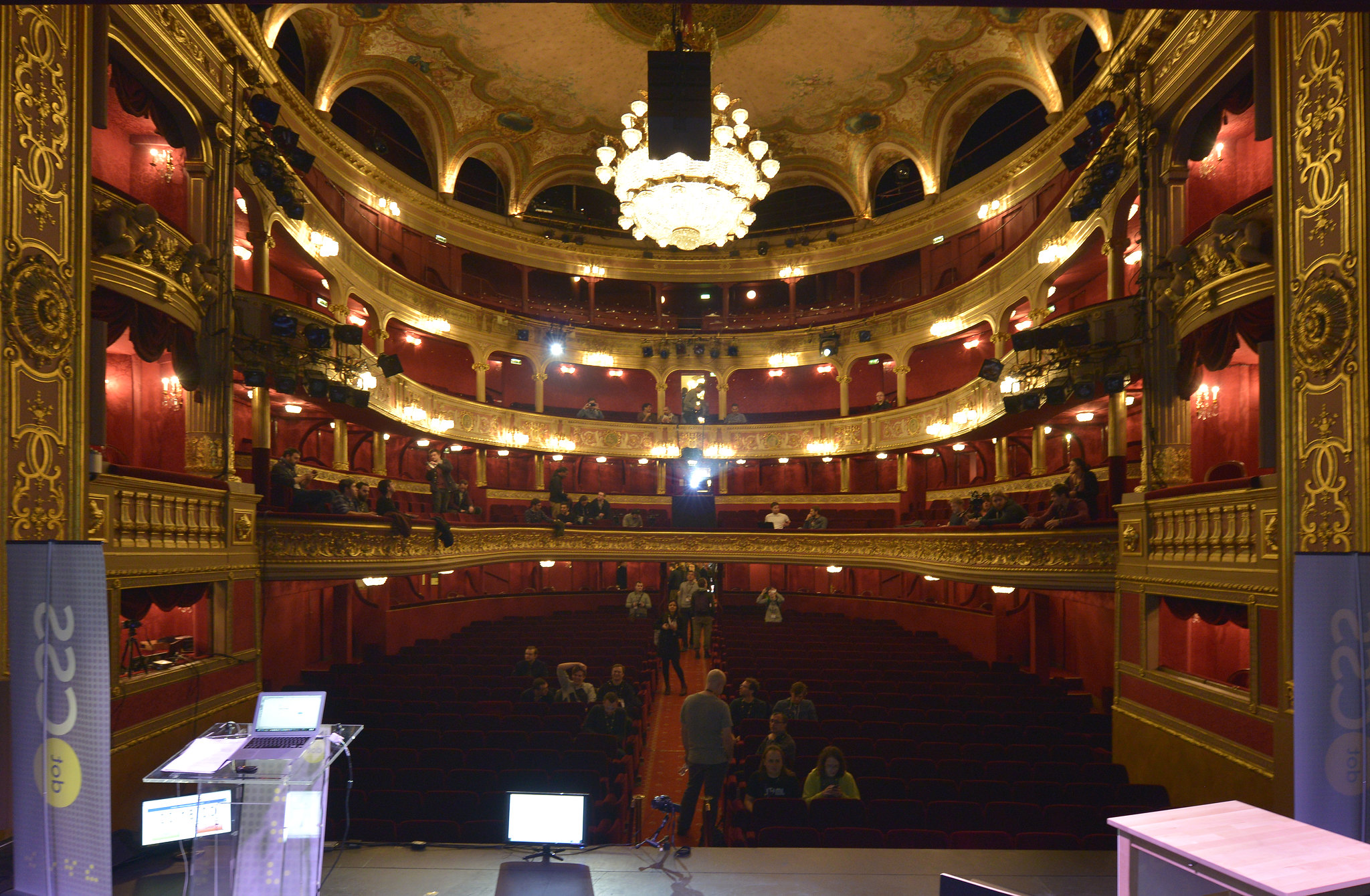 - [MP]quondam'Quondam' is
Latin for 'a certain'. - [AJB]xerxesPropser Jolyot de
Crebillon (1674-1762) was a French poet and playwright. His tragedy Xerxes was a relative failure, only performed once in France in 1714. - [MP]pasquinadeTo
pasquinade something is to mock it. - [MUStudStaff]genusA Latin phrase,
meaning 'and everything of that sort'. - [AJB]charlatanFrench for
quackery or fraudulence. - [MP]perdititTranslated from
Latin to mean "The first blast destroyed the old version." - [MP]rochStreet place near the
Church of Saint-Roch in Paris. The area is built around a series of chapels. It is located in
Montmartre, a historic neighborhood. The image here, from Wikimedia Commons,
shows the Church of Saint-Roch, photographed by Peter Lanczak.
- [MP]quondam'Quondam' is
Latin for 'a certain'. - [AJB]xerxesPropser Jolyot de
Crebillon (1674-1762) was a French poet and playwright. His tragedy Xerxes was a relative failure, only performed once in France in 1714. - [MP]pasquinadeTo
pasquinade something is to mock it. - [MUStudStaff]genusA Latin phrase,
meaning 'and everything of that sort'. - [AJB]charlatanFrench for
quackery or fraudulence. - [MP]perdititTranslated from
Latin to mean "The first blast destroyed the old version." - [MP]rochStreet place near the
Church of Saint-Roch in Paris. The area is built around a series of chapels. It is located in
Montmartre, a historic neighborhood. The image here, from Wikimedia Commons,
shows the Church of Saint-Roch, photographed by Peter Lanczak. 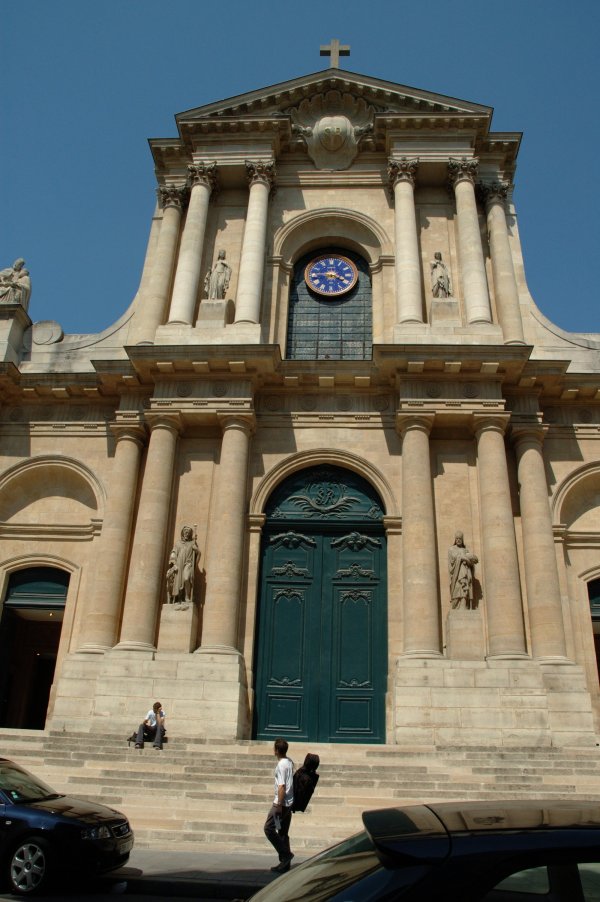 - [MP]gendarmesFrench police
officers. - [MP]sacreFrench for
"Sacred." - [MP]diableFrench for
"Devil." - [MP]mondieuFrench for "My
God!". - [AJB]mansardFrench for
"Attic". - [MP]robeFrench for
"dressing-gown—to hear the music better." - [MP]vidocqEugene Francois
Vidocq was a famous French criminal turned detective, whose exploits often inspired the work
of Poe and his contemporaries. - [MP]logeFrench for "janitor's
closet". - [MP]outreFrench for
"outrageous," often meaning strange or unusual. - [MP]posterioriLatin
phrase indicating knowledge learned through experience. - [MP]santeA public psychiatric
hospital. - [MP]cuvierGeorge Cuiver
(1769-1832) was a French naturalist and writer who published work on the natural sciences like
anatomy and paleontology. - [MP]boisA public park located
in the western quadrant Paris. Established by Napoleon III in the mid 19th century, the park
remains a very popular spot for leisure activities for the western suburbs of the city.
Picture via Wikimedia Commons, taken by Celette in 2018.
- [MP]gendarmesFrench police
officers. - [MP]sacreFrench for
"Sacred." - [MP]diableFrench for
"Devil." - [MP]mondieuFrench for "My
God!". - [AJB]mansardFrench for
"Attic". - [MP]robeFrench for
"dressing-gown—to hear the music better." - [MP]vidocqEugene Francois
Vidocq was a famous French criminal turned detective, whose exploits often inspired the work
of Poe and his contemporaries. - [MP]logeFrench for "janitor's
closet". - [MP]outreFrench for
"outrageous," often meaning strange or unusual. - [MP]posterioriLatin
phrase indicating knowledge learned through experience. - [MP]santeA public psychiatric
hospital. - [MP]cuvierGeorge Cuiver
(1769-1832) was a French naturalist and writer who published work on the natural sciences like
anatomy and paleontology. - [MP]boisA public park located
in the western quadrant Paris. Established by Napoleon III in the mid 19th century, the park
remains a very popular spot for leisure activities for the western suburbs of the city.
Picture via Wikimedia Commons, taken by Celette in 2018.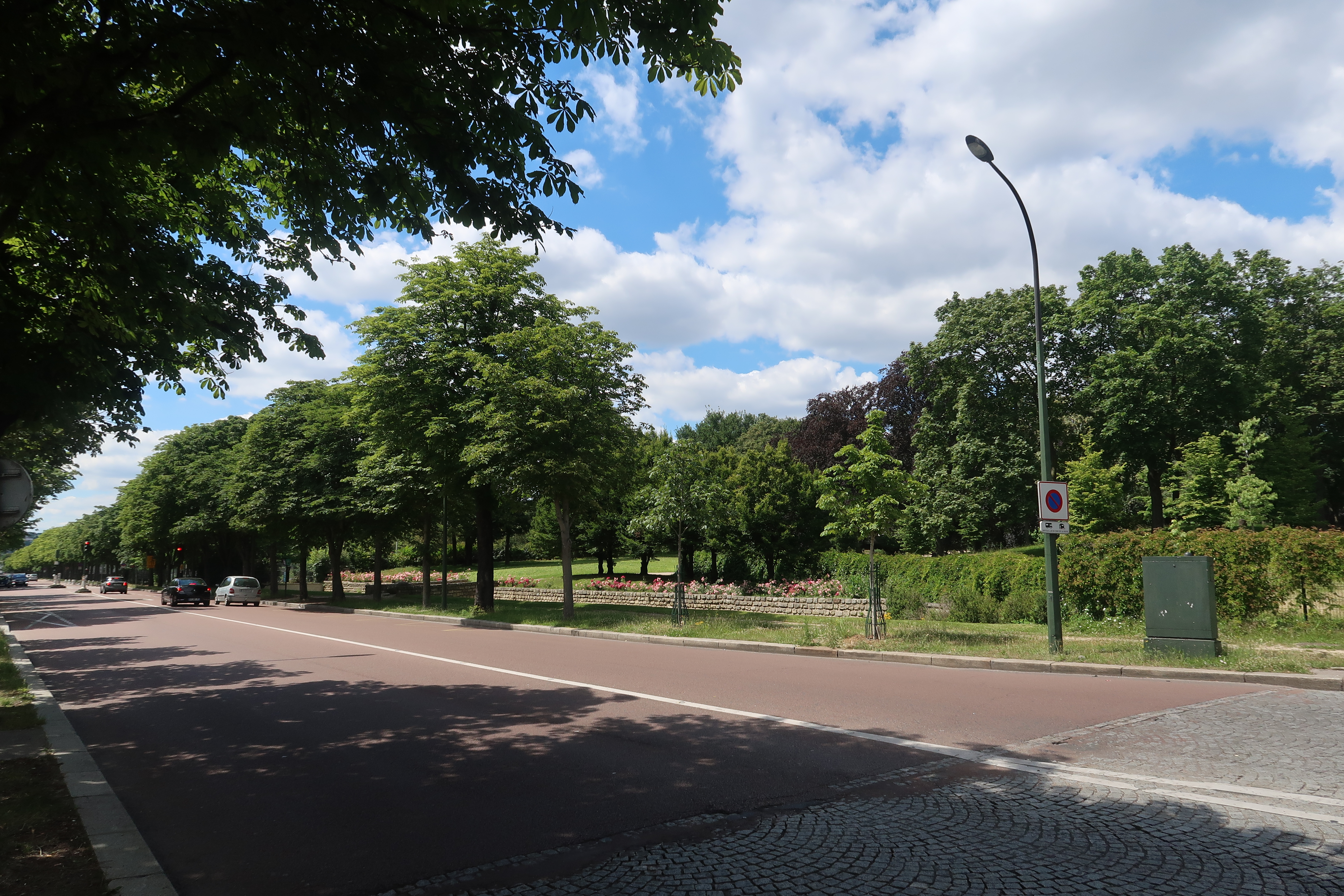 - [MP]cudgelA wood club or
staff with a clubbed end. - [MP]jardinDistinguished
botanical garden in Paris, considered the most prestigious and beautiful out of all the public
gardens. It is considered the main botanical garden of France. Picture taken by Guilhem Vellut
in 2016.
- [MP]cudgelA wood club or
staff with a clubbed end. - [MP]jardinDistinguished
botanical garden in Paris, considered the most prestigious and beautiful out of all the public
gardens. It is considered the main botanical garden of France. Picture taken by Guilhem Vellut
in 2016.  (picture) - [MP]prefectNational police
headquarters in Paris. - [MP]deFrench for "to deny what
is, and to explain what is not". - [MP]
(picture) - [MP]prefectNational police
headquarters in Paris. - [MP]deFrench for "to deny what
is, and to explain what is not". - [MP]BY EDGAR A. POE.
It is not improbable that a few farther steps in phrenological science will lead to a belief in the existence, of not to the actual discovery and location of an organ of analysis. If this power (which may be described, although not defined, as the capacity for resolving thought into its elements) be not, in fact, an essential portion of what later philosophers term ideality, then there are indeed many good reasons for supposing it a primitive faculty. That it may be a constituent of ideality is here suggested in opposition to the vulgar dictum (founded, however, upon the assumptions of grave authority,) that the calculating and discriminating powers (causality and comparison) are at variance with the imaginative—that the three, in short, can hardly coexist. But, although thus opposed to received opinion, the idea will not appear ill-founded when we observe that the processes of invention or creation are strictly akin with the process of resolution—the former being nearly, if not absolutely, the latter conversed.
It cannot be doubted that the mental features discoursed of as the analytical, are, in themselves, but little susceptible of analysis. We appreciate them only in their effects. We know of them, among other things, that they are always to their possessor, when inordinately possessed, a source of the liveliest enjoyment. As the strong man exults in his physical ability, delighting in such exercises as call his muscles into action, so glories the analyst in that moral activity which disentangles. He derives pleasure from even the most trivial occupations bringing his talent into play. He is fond of enigmas, of conundrums, of hieroglyphics—exhibiting in his solutions of each and all a degree of acumen which appears to the ordinary apprehension præternatural. His results, brought about by the very soul and essence of method, have, in truth, the whole air of intuition.
The faculty in question is possibly much invigorated by mathematical study, and especially by that highest branch of it which, unjustly, and merely on account of its retrograde operations, has been called, as if par excellence, analysis. Yet to calculate is not in itself to analyse. A chess-player, for example, does the one without effort at the other. It follows that the game of chess, in its effects upon mental character, is greatly misunderstood. I am not now writing a treatise, but simply prefacing a somewhat peculiar narrative by observations very much at random—I will, therefore, take occasion to assert that the higher powers of the reflective intellect are more decidedly and more usefully taxed by the unostentatious game of draughts than by a the elaborate frivolity of chess. In this latter, where the pieces have different and bizarre motions, with various and variable values, that which is complex is mistaken (a not unusual error) for what is profound. The attention is here called powerfully into play. If it flag for an instant, an oversight is committed, resulting in injury or defeat. The possible moves being not only manifold but involute, the chances of such oversights are multiplied; and in nine cases out of ten it is the more concentrative rather than the more acute player who conquers. In draughts, on the contrary, where the moves are unique and have but little variation, the probabilities of inadvertence are diminished, and the mere attention being left comparatively unemployed, what advantages are obtained by either party are obtained by superior acumen. To be less abstract—Let us suppose a game of draughts, where the pieces are reduced to four kings, and where, of course, no oversight is to be expected. It is obvious that here the victory can be decided (the players being at all equal) only by some recherché movement, the result of some strong exertion of the intellect. Deprived of ordinary resources, the analyst throws himself into the spirit of his opponent, identifies himself therewith, and not unfrequently sees thus, at a glance, the sole methods (sometime indeed absurdly simple ones) by which he may seduce into miscalculation or hurry into error.
Whistwhist has long been noted for its influence upon what are termed the calculating powers; and men of the highest order of intellect have been known to take an apparently unaccountable delight in it, while eschewing chess as frivolous. Beyond doubt there is nothing of a similar nature so greatly tasking the faculty of analysis. The best chess-player in Christendom may be little more than the best player of chess—but proficiency in whist implies capacity for success in all those more important undertakings where mind struggles with mind. When I say proficiency, I mean that perfection in the game which includes a comprehension of all the sources (whatever be their character) from which legitimate advantage may be derived. These are not only manifold but multiform, and lie frequently among recesses of thought altogether inaccessible to the ordinary understanding. To observe
Footnotes




 (picture)
(picture)